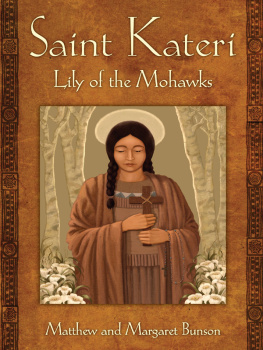CHAPTER ONE
THE WONDERFUL news had been completely unexpected and made the young man happier than he had ever been. Four Jesuit seminarians at the College of Clermont, in the heart of Paris, were to be ordained ahead of schedule and sent immediately to the missions in New France, and he was one of them. The news was wonderful in many ways. Its evidence of the urgent need for more priests in New France was proof of the success of the Jesuit missions there. The mere fact that the missions were flourishing was also proof of the effective and peaceful French rule in the new colony. But to Isaac Jogues, the best part of the news was that it would make him a priest and a missionary more than a year sooner than he had hoped.
It was January, 1636, and Paris was under a blanket of snow which had fallen before Christmas and lingered. Ordinarily, the Jesuit ordinations would have been held in June and families of the ordinands would have traveled from the ends of the earth, if necessary, to witness the great event. But now the roads were bad and travel difficult. And there was no time. Waiting in French ports were ships ready to dash across the Atlantic at the first hint of spring. The ships would not wait for their families. Thus at the end of January the four seminariansIsaac Jogues, Charles Gamier, Pierre Chastellain, Paul Ragueneauwere ordained in the college chapel in the presence of the Jesuit community.
There had been a period recently when Isaac Jogues doubted that he would ever reach the priesthood. He had always been a brilliant student, but then he encountered the subtleties of theology and they staggered him. His studies came hard. For a while, he seriously considered putting them aside and becoming a Jesuit lay brother. Only by the sternest application was he able to labor his way through the complex subject, and he was still looking forward with dread to another arduous year of it when the news came that he was soon to be ordained, that his studies had come to an end.
He wrote his mother immediately, telling her first of the special blessing which he considered the news to be and then expressing his regret that, because of the circumstances, she would be unable to witness the ordination which meant almost as much to her as it did to him. He added that, in view of the urgency, he probably would not have the opportunity to return to his home parish in Orleans to celebrate his first Solemn High Mass.
Madame Jogues would not hear of it. She knew, however, that it was useless to insist that he ask his superiors for permission to come home. Just the year before he had refused to request a similar permission in order to attend his sisters wedding. At first, Madame Jogues suspected that the Jesuit superiors, as an exercise in holy obedience, had refused the permission, but Isaac assured her in a letter: It never entered my mind to speak of the matter to my superiors. The urgent duties of my work do not permit me to leave the house even for a single day. Moreover, my presence at this ceremony was not at all necessary. The prayers that I am able to offer for the happy result of this marriage are as helpful from afar as they would be near.
But a first Mass was something else. This time, Madame Jogues decided not to leave the decision to her son. Instead, she wrote his superiors, suggesting that since she had given her favorite son to the Jesuits for life would it not be a simple kindness on their part to return him for a few days so that she could have the joy of beholding him at the altar just once before they shipped him off to the other side of the world. The Jesuits bowed. Early in February, Isaac Jogues found himself in a coach, careening southward over the muddy, gutted roads on the seventy-five mile trip to Orleans.
The Jogues of Orleans were a prominent and affluent family, deriving their income from business enterprises in the city and sizable estates in the country. Isaac Joguess father, Laurent, like all heads of the family, held public office. Laurent Joguess first wife, a member of minor royalty, died after presenting him with two daughters; his second wife, Franoise, whose family was also successful in business, gave him six sons and a daughter. Isaac, born at two oclock on the morning of January 10, 1607, was the third son. And he became his mothers pet. He took after her side of the family; fair, slender, rather delicate in appearance and shorter than others his age, flashing dark eyes, well-bred by nature as well as by circumstances. He received his early education at home from his mother and private tutors; at ten he entered a Jesuit school attended by sons of only the best families. At seventeen, he announced that he wanted to become a priest.
His mother was pleased. As a Catholic mother, Madame Jogues was aware of the special honor it was to have a son called to the priesthood. In this case, there was a particular reason for happiness. As a priest, Isaac would never be separated from her as completely as her other sons, who had married and had become preoccupied with their own families. He would always be available to provide her with love, attention and comfort. A widow now, she needed this. Furthermore, with the boys intelligence and the familys position, there was every likelihood that he would go far in the Church: he might even become a bishop. It seemed proper that a Jogues should expect to reach such heights.
All these expectations fell apart when Isaac explained that the kind of priest he wanted to become was a Jesuit priest. This changed the picture entirely. It meant, among other things, that he would have to go wherever the Jesuits sent him, and Madame Jogues would have nothing to say about it. Jesuits worked as teachers and missionaries all over the world: her dear Isaac, as she always called him, might be assigned to some horrible place and forced to live in the worst circumstances. The prospect saddened her and she tried to dissuade him, but he was adamant and he got his way.
For the next twelve years, Madame Jogues saw little of her son, scarcely more than a week or two a year, and sometimes not even that. She suffered because Jesuit rules prevented her from swamping Isaac with daily shipments of the delicacies he had enjoyed at home. Only the happiness that glowed in his letters comforted her to the point of resignation where she could admit that he had made the right decision. His letters came regularlyfrom Rouen, where he spent two years in the novitiate; from La Fl00E8che, where he studied philosophy for three years; from Rouen again for four years, where he taught in a Jesuit college; and then from Clermont in Paris, as he struggled with theology. Then came the letter with the news of his ordination and his imminent departure for New France, the letter promptly followed by one from Madame Jogues to the Jesuit superiors and he was on his way home.
He had changed. Years of prayer and study had made him quiet and reflective. Still in the first glow of ordination, he was preoccupied with gratitude to God for the gift of holy orders. He had always been a warm and outgoing person, and he continued to be, but now there was a certain reserve about him, acquired through a solemn realization of both the responsibilities and opportunities endowed him by his priesthood. He was now a man of God in a particular way, equipped with faculties which could send a soul to Heaven. For this reason he cherished his priesthood and he was determined to keep it unblemished. He was Gods, and he lived now only to make all others His.
His mother noticed the change. Father Isaac s first Mass was scheduled for February 10, the first Sunday of Lent He reached home early in the week, at the height of the pre-Lenten carnival. Orleans was one big party. Because of the special reason for joy in the Jogues household, there was even greater festivity. The young priest was the center of it. Relatives, friends, neighbors all packed the house, eager to congratulate Isaac, to drink to his long life. He accepted the attention with amiable restraint, appearing in the main parlor whenever a new crowd arrived, acknowledging the congratulations with a smile and polite gratitude, giving his blessing when it was requested, then unobtrusively withdrawing to his own room when the visitors turned to wine and food, holiday gaiety and local gossip. Only his mother witnessed his subtle escapes, watching him depart with a gaze that was long and sad.














